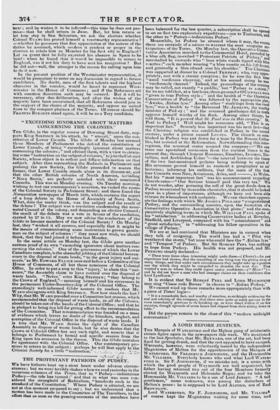THE PROTESTANT PATRIOTS OF PUDSEY.
Ws have hitherto kept up a stout heart under adverse circum- stances; but we were terribly shaken when we read yesterday in the veracious columns of the Times, that in " Pudsey—industrious Pudsey—the tide has turned ;" and that in what was once con- sidered the stronghold of Radicalism, "hundreds rush to the standard of the Constitution." Where Pudsey is situated, we are not at this moment prepared to say ; but we understand that a motion has been made in the Committee of The Travellers, to the effect that as soon as the gaming-accounts of the members have been balanced for the last quarter, a subscription-shall be opened to set on foot two exploratory expeditions—one to Tirnbuctoo, and the other to " Pudsey—industrious Pudsey."
Meanwhile, let Pudsey be situated where it may, the events there are certainly of a nature to warrant the most sanguine se. ticipations of the Tories. On Monday last, the Operative Ceases. votive Association marched to the Commercial Hotel, preceded by a blue silk flag, inscribed " Protestant Patriots of Pudsey," and marshalled by stewards who " bore white wands tipped with blue n settes ;" each member wearing "a blue rosette on his left bread and generally a blue rilland over his shoulder." The Chairman' was supported at dinner by a Colonel TEMPEST; who, very appro. priately, met with a stormy reception; for he rose the first time "amid vociferous cheering," and at his second rising he was "vociferously cheered." Indeed, the proceedings of the evening may be called, not exactly " a puddle," but "Pudsey in a storm;" for we are told that, at a late hour, three groans for Otosusets were "given in true Pudsey style ; " and the health of " the Operative Conservatives of Pudsey" was followed by the appropriate glee, "Awake, zEolian lyre." Among other " warleings from the vocal lyre," was a health to "the Reverend Mr. JENKINS, the worthy minister of Pud,ey ; " and the reverend gentleman did in troth approve himself worthy of his flock. Among other things, he told them, "It is proved that Si. Paul was in this country." St. Paul in Pudsey I Well might his reverence add, "This is an important fact." Scarcely less important was his next fact—that the Christian religion was established in Pudsey in the second century, under a prince named Lucius. The church so esta- blished in Pudsey was put down for a time by the Roman Catho- lics, but restored at the Reformation. Notwithstanding this inters regnurn, the reverend orator assured the company—" We can trace our apostolical succession from the earliest times to the present day, through Clement Roniatius, Eusebius, Iremous, Ter. tullian, and Archbishop Usher "—the intersal between the times of the two last-mentioned prelates being nothing to speak of His reverence proved himself as eminent a geographer as an' historian; informing his auditors, that the seats of the first four Councils were Nice, Ariminum, Arles, and ---, in Wales. But his "most important fact" was his announcement regarding Church-rates—" Our Saviour himself paid this very tax." We do not wonder, after perusing the roll of the great deeds done in Pudsey as narrated by its erudite chronicler, that it should be looked upon as a place of importance, although we have not been able to trace its whereabout with certainty. We can therefore approcis ate the feelings with which Mr. JOSHUA POLLARD "congratulated Pudsey, and the surrounding country, upon the formation of a Conservative Operative Association in that place ;" and the coins paratively slighting terms in which Mr. WILLIAM PAUL spoke of his "satisfaction" in addressing Conservative bodies at Beverley, Sheffield, and Liverpool, compared with his "astonishment" and "great satisfaction" in "addressing his fellow operatives in the village of Pudsey." We are at last convinced that Ministers are in earnest when they talk of resigning. The world has had a " Pilot who weathered the storm," but none who could face the " /liolian lyre" and "Tempest" of Pudsey. But Sir ROBERT PEEL has nothing to hope from Pudsey. His health was not proposed, and Mr. PERRING Stoutly declared- " These were times when trimming might undo them—( Cheers)—for past experience had shown, that the conceding of one thing was the giving away of many things, and that under such circumstances they might take up a position one day which they might be compelled to abandon the next day. They wanted a man in whom they could repose entire confidence—(" Hear ! and he did not know a man who had stronger claims on their confidence than Lord Lyndhurst."
It is evident that Sir ROBEICI" PEEL and LORD MELBOURNE may sing "Cease rude Boreas " in chorus to "iEolian Podsey:' We cannot wind up these remarks more appropriately than with a piece of Times' logic— "It is a remarkable fact, and worthy of mention, as strikingly evidencing the zeal and sobriety of the company, that there were quite as many per,ons to the room immediately previous to its breaking tip, as were dined within it on the occasion, though upwards of seven hours had elapsed frotu their sitting down to table."
Did the parson remain to the close of' this "modern midnight conversation?"


























 Previous page
Previous page